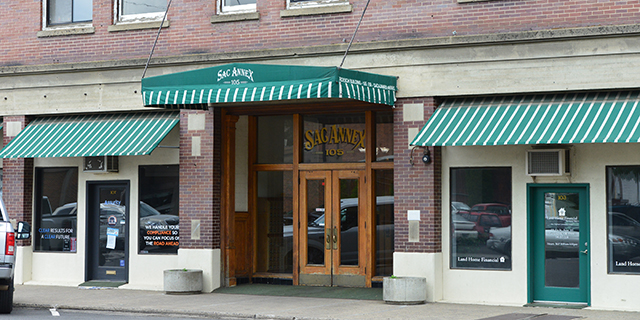Changing the world two by two
Published 12:00 am Saturday, March 17, 2007

- A WORK OF ARK: Pastor Clay Andrew, La Grande United Methodist Church, shows off one of the arks that holds offerings for Heifer International. The hope is to raise $5,000 to purchase an "ark" of animals for an impoverished community. The ark is one of several built for the project by church member and art major Roy Gomez. It represents Noah's Ark as described in Genesis, and is sturdy enough to be used again for next year's effort. (The Observer/MARDI FORD).
LA GRANDE Food. More and more, filling the pantry seems to be just another chore we Americans like to complain about.
Unless we have witnessed third world poverty firsthand, it may be impossible to understand that the ready abundance of food sources we take for granted would be an unimaginable luxury in other parts of the world.
Earlier this year, the United Methodist Church Missions and Outreach Ministry Team approached the congregation about using offerings taken during Lent and donating them to Heifer International to make a difference in someone else’s food resources.
For more than 60 years, the common sense driving Heifer International’s program is to provide starving families a source of food rather than short-term relief hand-outs through the donations of livestock.
Methodist Pastor Andrew Clay says part of what makes this program so great is that receiving a gift from Heifer means you have to pass that gift on to other folks through the offspring of the original animal.
“So the gift keeps on giving,” Andrew says.
In fact, passing on the gift is fundamental to Heifer’s entire approach, creating what they refer to as a living chain of giving.
As people share the offspring of their animals as well as their new knowledge, resources and skills an expanding global network of hope, dignity and self-reliance is created.
The goal set by the Methodist Church is to raise enough money to buy an entire ark.
“An ark is a whole mess of animals and costs $5,000. We’d like to have the churches of La Grande, as well as individuals, raise enough money to buy an entire ark,” Andrew says.
So far, other churches that have embraced the project include La Grande’s First Christian Church, First Presbyterian Church Sunday school, St. Peter’s Episcopal and the Cove United Methodist.
Their hope is to finish this project by Easter, so they are hoping for more churches or groups to join them.
The history of how the program started, Andrew says, is really interesting.
During the Spanish Civil War, a Midwestern farmer serving as a Church of the Brethren relief worker, was ladling out rations of milk to hungry children when the thought hit him, “These children don’t need a cup, they need a cow.”
The farmer, Dan West, was forced to decide who would receive the limited rations and who wouldn’t literally, who would live and who would die. He knew that kind of aid would never be enough.
When he returned home, West formed Heifers for Relief, a program dedicated to ending hunger permanently by providing families with livestock and training so that they would “be spared the indignity of depending on others to feed their children.”
In 1944, the first shipment of 17 heifers left York, Pa., headed for Puerto Rican families whose malnourished children had never tasted milk.
In 1964, a cowboy named Bill Beck accompanied a shipment of 20 polled Hereford heifers, one bull and 20 pigs on board a ship bound for Japan.
In a collection of journal entries published in 1994 in a book titled “Cowboy Memories,” Beck wrote this:
“A highlight of the trip was traveling to the Iwate Prefecture to meet the farmers receiving the cattle for this cooperative project. We entered a great hall set for a banquet with tables in a half circle…(where) I was given a seat of honor. What a humbling experience when all you have done is feed and care for the animals generously given by others. I (told) them about farmers who had given animals and churches that had collected money to provide these livestock. As we drove away Kentara Buma, the Japan Church World Service director, said, ‘You need to know that most of these farmers walked all morning to come and say, Thank you!’ The emotions of that moment have lasted me a
lifetime.”
For more than 60 years, the simple idea of giving families a source of food rather than short-term relief caught on and has helped
7 million people in more than 125 countries. That figure does not including those like Bill Beck whose life was impacted as well through the simple act of selfless giving.
For information on Heifer International, go online to www.heifer.org.
For more details on how to be involved in the local project, call Andrew at the church office at 963-2498.









